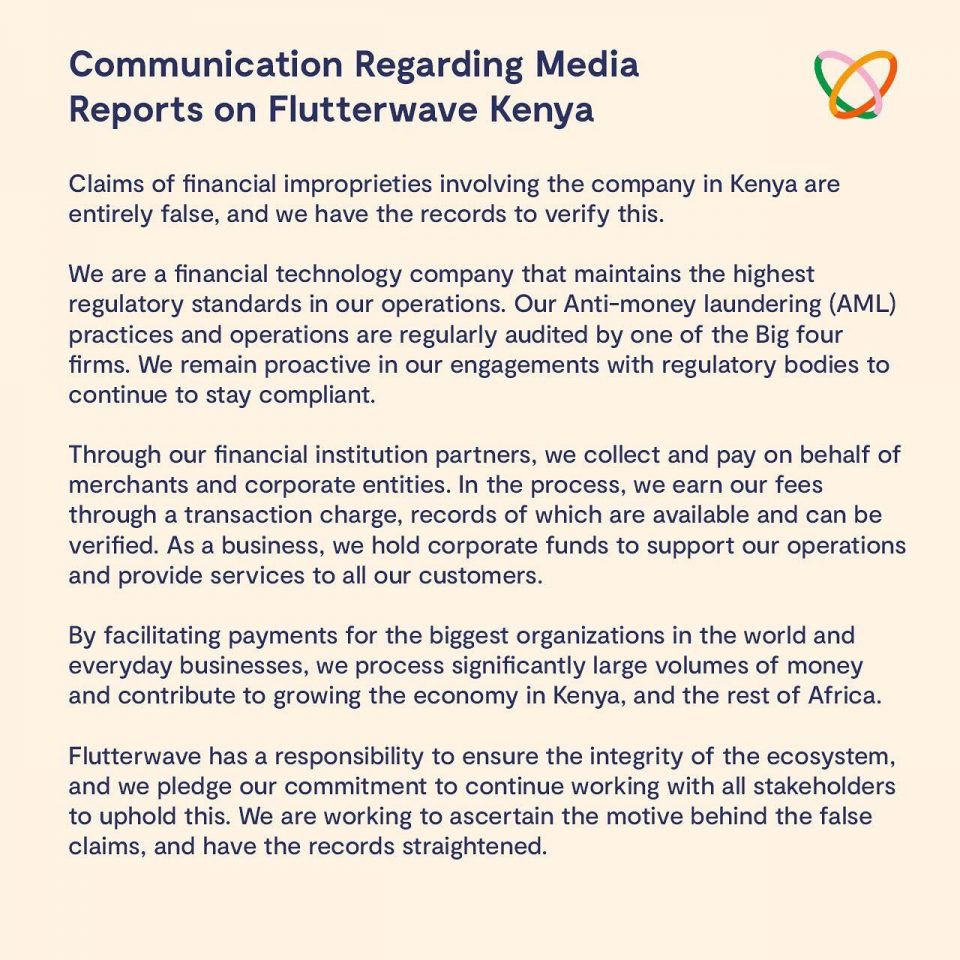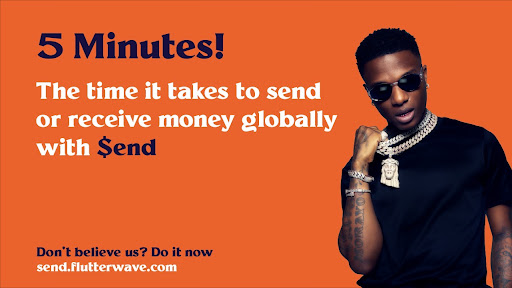
8 JULY, 2022
IN PARTNERSHIP WITH

Happy Friday 🎊
Today at 6 PM (WAT), we’ll be hosting a Twitter Space that’s going to answer all your questions about growth.
At our Startup Growth Clinic, we’ll be opening the floor for questions from anyone who wants to know how they can acquire customers and increase sales and growth using tech.
In today’s edition
- Flutterwave responds to allegations
- Quick Fire 🔥
- Ghana prepares for the eCedi
- Vodacom axes its video streaming services
- Funding Tracker
- Event: TC Live
- Job opportunities
FLUTTERWAVE RESPONDS TO THE ARA’S ALLEGATIONS
Fintech unicorn, Flutterwave, has responded to allegations of money laundering levelled at it by Kenya’s Asset Recovery Agency (ARA).
ICYMI: On Wednesday, Kenya’s ARA accused Flutterwave of laundering over $59.2 million. The agency obtained a court order to inspect and freeze the fintech’s 52 bank accounts. The ARA also alleged that there is no evidence of Flutterwave operating a merchant service in the country.
What’s Flutterwave’s response?
According to a statement released by the fintech, the ARA’s claims are “entirely false”.
“We are a financial technology company that maintains the highest regulatory standards in our operations. Our Anti-money laundering (AML) practices and operations are regularly audited by one of the Big four firms. We remain proactive in our engagements with regulatory bodies to continue to stay compliant,” the statement read.
Zoom out: The fintech is yet to respond to specific allegations made by the ARA, especially ones regarding the legality of its services in Kenya. It also has not commented on whether or not its bank accounts have been frozen, or if it will appear in court later this November.
QUICK FIRE 🔥 WITH TOPE ALABI
Tope Alabi is a software engineer. He is the co-founder and CEO of Afriex, a fintech facilitating intra-African and international remittances.
Explain your job to a five-year-old.
I make it easy for people to send money overseas.
Why did you decide to be a software engineer?
I studied electrical engineering in school, so software development wasn’t totally new to me, although the stuff we worked with in school was much more focused on hardware than internet technology. Like all engineers, I had the confidence that I could build anything, even if I hadn’t done it before. When I got out of school it was tough to get a job, so I spent a few months staying with my mum. While I was there, I helped her build a website for her healthcare business because I thought it would look more professional.
It was through that experience that I learned to build websites and eventually other internet technologies.
As a software developer, what’s one misconception people have about your job?
That when you build it, the job’s done. Most of software development is maintenance. Building software is like building a house: you have to keep maintaining it and checking on it, or it will get dusty and overrun with pests.
You’re a fintech founder yourself. Do you think Africa has too many fintechs? Why or why not?
No, Africa needs more fintechs. Finance is the foundation upon which all other industries are built. Remittance is the bridge that connects each country to the outside world, credit/lending provides leverage to invest, stocks and crypto allow you grow your money without working, and insurance protects your assets against disaster and allows you to keep building.
Every other industry needs these tools, and without these tools it is very hard to build an advanced economy.
What (singular) achievement are you most proud of?
I’m proud of the work we have been able to do at Afriex so far, but the job is not done; we still have a long way to go.
What’s something you love doing that you’re terrible at? And something you really do not like doing but are great at?
I love playing arcade games, but I’m terrible at them because I only get to play once every year or so.
I’m great at predicting what happens next in movies, but I don’t like watching movies in the first place. Maybe that’s why I don’t like watching movies.
Do you think Web3 is solving any immediate or even future problems?
Not yet, but it will. Web3 is about decentralisation; this is a theme that we have seen throughout the history of the internet.
SEND BY FLUTTERWAVE
Don’t just send money, send money fast. Send and receive money directly to mobile wallets, bank accounts, Barter or through cash pickup with $end.
Visit send.flutterwave.com and do it now!
This is partner content.
GHANA PILOTS eCEDI, ITS DIGITAL CURRENCY
With all the crypto bans across the continent, many African governments have made it clear they don’t want their citizens to use crypto, except, of course, it is a digital version they can control.
Currently, no less than 15 African countries have made efforts towards launching central bank digital currencies (CBDCs). Now, Ghana is already taking its plans for its eCedi to the next level, shortly after South Africa made similar strides.
Ghanaians are already shopping with eCedi
Ahead of its launch, the viability of Ghana’s digital currency is currently being tested in the small town of Sefwi Asafo. There seems to be an interesting adoption of the currency there as some residents are already paying for their daily groceries with the e-currency.
For the Ghanaian government, this usage means data they can leverage to improve the product before its final launch.
Again, “banking the unbanked”
These days, everyone wants to bank the unbanked, from the fintechs to the central banks. The Bank of Ghana’s governor says the eCedi project will bank the unbanked and digitise the offline transactions of rural households. Let’s ignore the fact that many rural folks will find the concept of a digital wallet amusing. eCedi is a new beginning, we hope.
Zoom Out: Since 2018, up to 15 African countries have made effort to create central bank digital currencies, with Nigeria being the only country to have launched a CBDC. Experts say these governments are trying to become stakeholders in the digital payments system but, frankly, who wants centralised crypto?
SELL MORE WITH PAYSTACK
Increase your online sales with a Paystack Storefront – a free, beautiful seller page that helps you bring creative ideas to life.
👉🏾 Learn more at paystack.com/storefront
This is partner content.
VODACOM AXES ITS VIDEO STREAMING SERVICE
South African mobile network provider, Vodacom, has put the brakes on its video streaming service Video Play which it launched in 2015.
Surprise, surprise
According to MyBroadband, users of the service were last week greeted with a message informing them that the service would be shut down on June 30, 2022.
Vodacom also seems to have removed the streaming service’s apps from Google’s Play Store—where it had over a million downloads—and Apple’s App Store. The service’s website is also unavailable.
But why though?
In response to the decommissioning of the service, Vodacom spokesperson, Byron Kennedy, mentioned to News24 that the discontinuation of Video Play was a strategic decision to no longer be an upfront purchaser of content in keeping up with the company’s launch of VodaPay, a lifestyle Super App where it will provide access to a variety of third-party content services, and products from over 90 merchants.
Kennedy further stated that Vodacom will move to a subscription service model which will offer customers a variety of subscription bundles for the large variety of local and global entertainment services through the VodaPay Super App.
Big picture: Video Play joins a long list of other on-demand streaming services provided by mobile network operators to be unceremoniously axed. Others include MTN’s FrontRow, which was discontinued in 2017, and Cell C’s Black, which was cancelled in 2019.
TRY FINCRA’S PAYMENT SOLUTIONS
Fincra provides easy-to-integrate APIs developed and designed to launch seamless and reliable global payment solutions.
With Fincra’s customisable APIs, developers can build quick financial applications.
Build the best payment solutions on Fincra.
This is partner content.
IN OTHER NEWS FROM TECHCABAL
Ahead of ASIS summit, Sterling One held a press conference that brought together key public, corporate, and development-sector stakeholders from across the world to engage in regional inclusive development discussions to accelerate the Sustainable Development Goals and mobilise impact investments into vital African economic sectors.
In a bid to prepare for the future of smart retail, South African mobile network operator Vodacom is rolling out Software-Defined Wide Area Networking (SD-WAN) technology at various retailers in the country to allow its customers to have a digital future-ready network.
Senegalese-US fintech Wave has secured a €90 million ($91 million) syndicated loan from the International Finance Corporation (IFC), the investment arm of the World Bank, and other sources.















